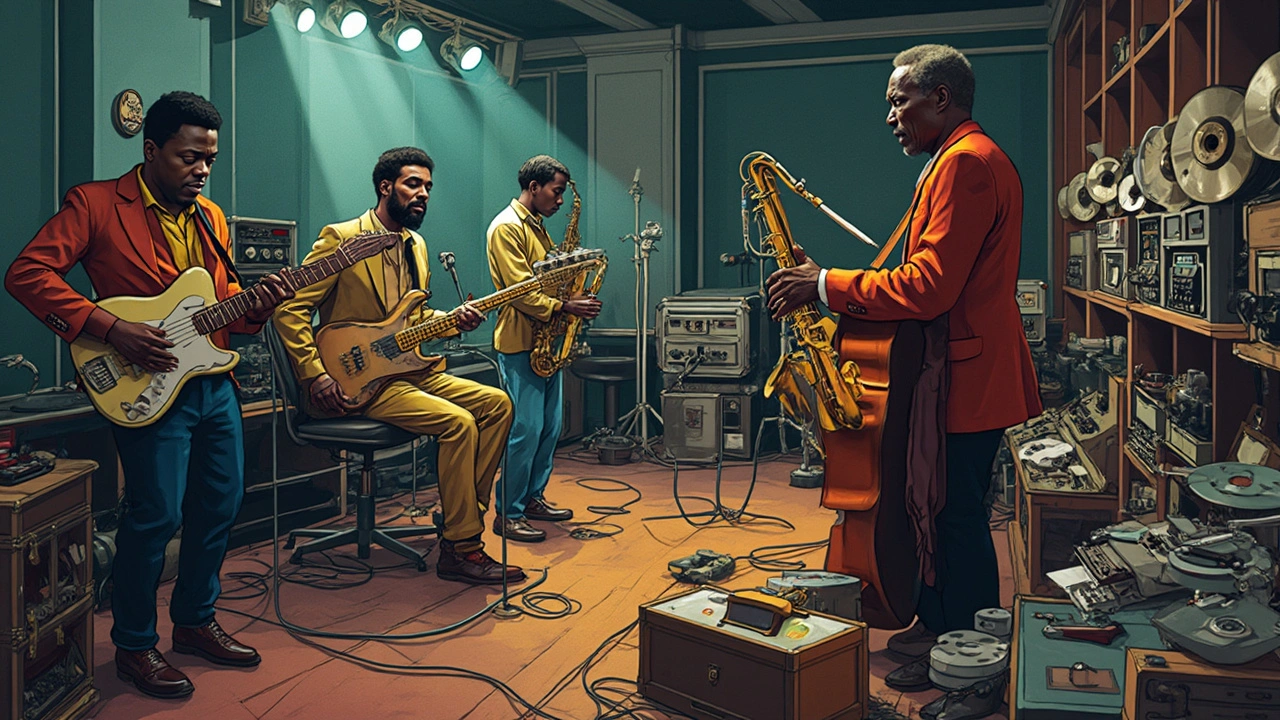Black music has a rich history, with gospel being its beating heart. Gospel music, overflowing with heartfelt emotion and spiritual depth, laid the groundwork for what would later evolve into soul music. It wasn't just about the music—it was a movement, deeply tied with community and church life, inspiring many genres that followed.
So, how exactly did gospel morph into soul? It wasn't an overnight change. Over time, cultural shifts and key historical moments nudged the music in a new direction. As African American communities migrated, they brought their musical traditions with them, fusing them with new sounds and experiences. The civil rights movement also played a significant role, with music being a rallying cry and form of expression.
- The Gospel Roots
- Cultural Shifts and Influences
- Iconic Soul Pioneers
- Soul Music's Impact
- Modern Reflections and Legacy
The Gospel Roots
The journey of Black music is deeply rooted in gospel. Born from the heartache and hope of African American communities, gospel music is all about expressing profound faith and resilience. The church was more than a place of worship; it was where the voices of the community came together in harmony.
Gospel music's influence exploded in the early 20th century, with churches serving as epicenters for this newfound musical expression. As the Sunday congregation filled the pews, the powerful melodies and stirring lyrics of gospel music resonated far beyond the church walls. Notable pioneers like Thomas A. Dorsey, often hailed as the 'Father of Gospel Music', blended Christian themes with jazz and blues rhythms, creating a sound that was both spiritual and refreshingly modern.
Key Characteristics of Gospel Music
- Call and Response: This comes from African tribal traditions and is a key feature where a leader sings a line, and the congregation responds.
- Impassioned Vocal Style: Gospel singers pour their emotions into their performances, making each song a heartfelt prayer.
- Instrumentation: Initially dominated by vocal harmony, the use of instruments grew, with the organ and piano leading the way.
Connection to Community
For many African Americans, gospel was more than just music—it was a communal experience. It brought people together in times of joy and hardship, strengthening community ties. Through the music, stories were shared, and legacies were passed down. It acted as both a comfort and a call to action, especially during tough times for the community.
As gospel music evolved, it set the stage for the birth of other styles, including soul music. Gospel's heartfelt emotion and communal spirit directly shaped the artist’s approach and sound in future genres, reflecting its enduring impact.
Cultural Shifts and Influences
The transformation from gospel to soul music didn't happen in a vacuum. It was driven by waves of cultural change throughout the 20th century. One major factor was the Great Migration. Starting in the early 1900s, millions of African Americans moved from the rural South to urban areas in the North. This movement didn’t just change their geographic landscape; it reshaped their musical one too.
In cities like Chicago and Detroit, these migrating communities found new social realities and musical tools. The sounds of urban life began influencing traditional gospel, integrating blues and jazz elements present in these vibrant cities. The mix was electric, and it became the fertile soil from where soul music would grow.
The Civil Rights Movement
Another monumental shift came with the civil rights movement. Music became a powerful voice for change, inspiring and galvanizing communities. Artists like Sam Cooke, who started in gospel, began infusing his music with messages of equality and change. Cooke's "A Change Is Gonna Come" became an anthem of the era, reflecting the hope and struggles of the time.
Technological Advances
As technology advanced, it also shifted how music was produced and consumed. The introduction of the electric guitar and improved recording techniques allowed for a richer, more varied sound. This newfound richness helped distinguish soul music from its gospel roots, adding layers and depth that resonated with a wider audience.
| Year | Significant Event |
|---|---|
| 1916 | Beginning of the Great Migration |
| 1950s | Development of electric instruments |
| 1960s | Boom of the civil rights movement |
These cultural shifts and technological advances were pivotal. They didn't just change the music; they altered its role in society, giving soul music a powerful emotional resonance that echoed across decades and continues to do so today.
Iconic Soul Pioneers
When we talk about soul music, there are some names you just can’t skip over. Think of them as the architects who laid down the blueprint for everything that followed. These legendary figures transformed the music industry and etched their names into history.
Ray Charles: The Genius
Ray Charles, often hailed as 'The Genius', was a trailblazer in the journey from gospel to jazz-flavored soul music. Blind from a young age, Ray had an unmatched ability to turn experiences into powerful melodies. His 1954 hit, "I Got a Woman," is often credited as one of the first true soul songs, blending gospel, jazz, and blues elements into something entirely new.
Aretha Franklin: The Queen of Soul
There's a reason Aretha Franklin is called the Queen of Soul. Her voice, powerful and filled with emotion, became an anthem for the civil rights movement. With hits like "Respect" and "Chain of Fools," Aretha brought a fiery, passionate energy to soul music that resonated across the globe. Her ability to weave emotion into each note set a standard that others aspired to meet.
James Brown: The Godfather
You can't talk about soul without giving a nod to James Brown, a key figure in shaping the genre into a cultural powerhouse. Known for his electrifying performances and dynamic stage presence, Brown's influence is unmistakable. His music, particularly tracks like "Papa's Got a Brand New Bag," laid the foundation for what would become funk, sowing seeds in the soul music garden.
Sam Cooke: The Smooth Operator
Sam Cooke brought a smooth, silky touch to the sound of soul. Known for songs like "A Change Is Gonna Come," Cooke's music became synonymous with hope and change at a time when society was desperate for both. Tragically, his life was cut short, but his impact on soul music continues to reverberate.
These pioneers weren't just performers; they were visionaries who defined an era. By breaking boundaries and weaving their personal stories into their music, they turned soul into not just a genre but a powerful cultural statement.
Soul Music's Impact
Soul music wasn't just a soundtrack; it was a force that resonated through society, reshaping the cultural landscape and influencing countless artists across genres. Dive into how this emotionally rich genre left its mark on the world.
Driving Social Change
Soul music emerged alongside the civil rights movement, amplifying its messages with powerful emotional depth. Icons like Aretha Franklin and Sam Cooke didn't just sing—they spoke to the struggles and triumphs of their times. Songs like 'A Change Is Gonna Come' became anthems of hope and resilience during tumultuous times.
According to cultural historian James Goodwin,
'Soul music provided the emotional compass for a generation fighting for equality. It was a voice when many felt voiceless.'
Crossing Genre Boundaries
But soul didn't stop there. It inspired and intertwined with other music genres, making its way into rock, pop, and R&B. Legends like The Rolling Stones and The Beatles openly credited Black artists for shaping their sound.
Moreover, soul music's influences are evident in modern-day music, with artists like Adele and Alicia Keys paying homage to those original stylings. The heartfelt lyrics and impassioned performances are evergreen, attracting new listeners every year.
Economic and Cultural Influence
Soul music also paved the way for Black artists in the music industry, setting the stage for future generations. The genre generated immense cultural and economic momentum, turning hits into gold and drawing diverse audiences around the world.
One striking fact is the timeless appeal of soul records. Take a look at this illustrative data:
| Artist | Total Albums Sold |
|---|---|
| Aretha Franklin | over 75 million |
| Stevie Wonder | over 100 million |
The numbers speak volumes about the genre's lasting power and influence! This legacy continues, inspiring artists and touching listeners globally.

Modern Reflections and Legacy
Let's talk about how soul music is shaking things up today and the lasting mark it's left. You can't really get away from soul music if you're into any kind of music scene now. It's embedded deep into many genres like R&B, hip-hop, and even pop. Artists are still tapping into that palpable emotion and powerful storytelling that are signature to soul.
Think about all the major artists today who draw inspiration from iconic soul legends. For example, folks like Adele, John Legend, and Alicia Keys not only channel the emotional depth of soul but also carry its rich melodies and styles into the mainstream. These artists always acknowledge their roots, which highlights the timelessness and endless influence of the genre.
Legacy in The Charts
Soul music’s legacy isn’t just about sound—it's seen in numbers too. Back in the day, albums from artists like Marvin Gaye and Aretha Franklin not only topped charts but also broke barriers. Let's not forget about the Grammy Awards—soul music's presence is unmissable. Every year, you see categories stacked with artists whose music screams old-school soul influence.
Cultural Impact
Soul isn't just about music; it's a huge part of cultural identity. It played a role in political movements and became a soundtrack for change. The resilience and power in soul have resonated with countless people, influencing fashion, dance, and even literature.
And today? Well, it still does the same. People's playlists now often include tracks that are deeply inspired by old soul hits, leading to a cycle of appreciation across generations.
Black music continues reshaping itself, but its soulful roots stay strong. The magic of soul is in its flexibility and ability to hit right in the feels, bridging past and present in a timeless harmony.



